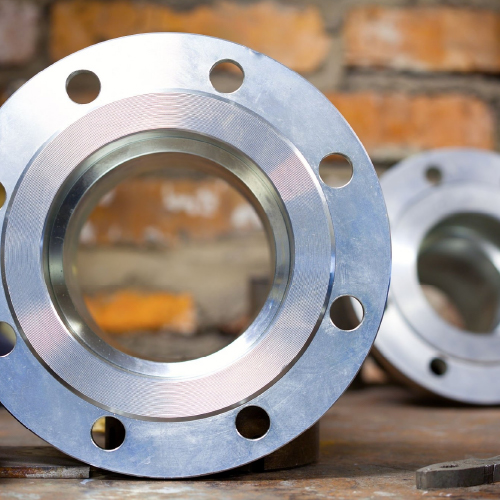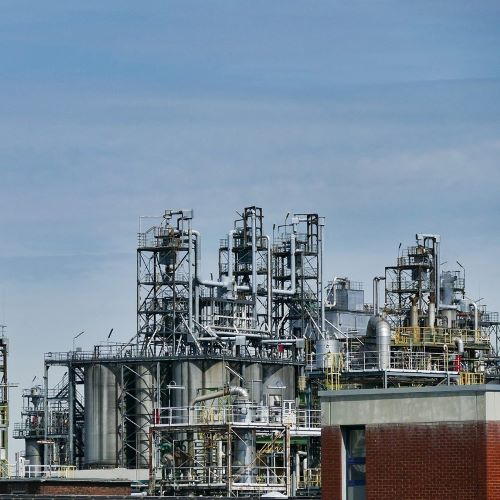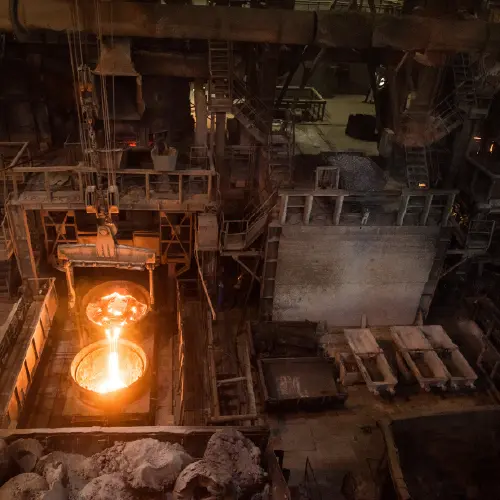Understanding Inconel 718 Flanges: Properties and Applications

UNDERSTANDING INCONEL 718 FLANGES: PROPERTIES AND APPLICATIONS
Overview Of This Article
- UNDERSTANDING INCONEL 718 FLANGES: PROPERTIES AND APPLICATIONS
- Introduction To Inconel 718 Flanges
- Inconel 718 Flanges and Their Role
- Properties of Inconel 718 Flanges
- Overview of Inconel 718 Flanges
- Applications of Inconel 718 Flanges
- Manufacturing and Testing of Inconel 718 Flanges
- Maintenance and Considerations of Inconel 718 Flanges
- Understanding Inconel 718 Flanges, Properties and Applications: The Conclusion
- THANK YOU
- DON'T MISS ON LATEST ARTICLES!
- MORE RELATED ARTICLES
Introduction To Inconel 718 Flanges
Inconel 718 flanges play a crucial role in various industries where high-performance materials are required to withstand extreme environments. As industries continue to push the boundaries of technology and explore new frontiers, the demand for reliable and durable components becomes increasingly important. Inconel 718, a nickel-based superalloy, has emerged as a go-to material for critical applications that require exceptional strength, corrosion resistance, and thermal stability.
Inconel 718 flanges find their significance in industries such as aerospace, oil and gas, chemical processing, and power generation, where they are subjected to rigorous operating conditions. These flanges must endure high temperatures, corrosive media, and extreme pressures, all while maintaining structural integrity and leak-tight seals. The performance and reliability of Inconel 718 flanges contribute to the overall efficiency, safety, and longevity of critical systems in these industries.
The aerospace industry heavily relies on Inconel 718 flanges for gas turbine engines, which operate in harsh conditions with high temperatures, intense pressure differentials, and corrosive combustion gases. These flanges ensure the integrity of the engine's fuel and air systems, contributing to the safe and efficient operation of aircraft. In the oil and gas sector, Inconel 718 flanges are employed in high-pressure and high-temperature (HPHT) applications, offshore platforms, and oil refineries where they exhibit resistance to sour environments, resistance to cracking, and compatibility with various oilfield chemicals.
In chemical processing plants, Inconel 718 flanges excel in handling corrosive media such as acids, alkalis, and reactive chemicals. Their exceptional corrosion resistance and high strength make them suitable for critical applications where the integrity of the process and safety are paramount. In the power generation industry, Inconel 718 flanges are used in heat exchangers, boiler systems, and high-pressure piping, where they withstand thermal cycling, high temperatures, and pressure differentials while maintaining dimensional stability and leak-tight seals.
Understanding the properties and applications of Inconel 718 flanges is crucial for engineers, designers, and industry professionals involved in the selection, design, and maintenance of piping systems. By harnessing the unique characteristics of Inconel 718, such as its high strength, excellent corrosion resistance, and thermal stability, engineers can ensure the reliable and efficient operation of critical systems in challenging environments.
By delving into the properties, manufacturing, and maintenance considerations of Inconel 718 flanges, we can gain valuable insights into their suitability for various applications. In the following sections, we will explore in detail the specific properties of Inconel 718, its manufacturing process, testing methods, and provide practical guidance for the maintenance and care of these flanges.
Inconel 718 Flanges and Their Role
Flanges are essential components in piping systems, serving as connectors between pipes or equipment. Their primary role is to facilitate the connection and disconnection of these components while ensuring a leak-tight seal. Flanges provide a secure and robust connection, allowing for the efficient flow of fluids, gases, or other materials through the system.
One of the key advantages of flanges is their versatility and compatibility with different types of pipes, valves, and equipment. Flanges come in various sizes, shapes, and designs, enabling easy adaptation to specific system requirements. They can be found in different configurations such as slip-on flanges, weld neck flanges, socket weld flanges, threaded flanges, and blind flanges, among others.
Flanges play a crucial role in system integrity and safety. By providing a leak-resistant joint, they prevent leakage, which is essential when dealing with hazardous materials, toxic substances, or valuable liquids. Properly installed and maintained flanges help minimize the risk of leaks, which can lead to environmental hazards, system inefficiency, and potential safety hazards for personnel.
Moreover, flanges allow for easy assembly, disassembly, and maintenance of piping systems. They enable the convenient replacement of valves, pumps, or other equipment without the need for cutting or altering the pipes themselves. This flexibility saves time, cost, and reduces downtime during maintenance or repairs.
Flanges also provide stability and support to the connected pipes or equipment. They help distribute the forces and stresses generated by fluid flow, pressure, or thermal expansion, preventing undue strain on the system. By acting as a rigid connection point, flanges enhance the overall structural integrity of the piping system.
Selecting the appropriate material for flanges is crucial, especially in applications where corrosion, high temperatures, or extreme pressures are expected. Inconel 718 flanges have emerged as a preferred choice for demanding environments due to their exceptional properties, including high strength, corrosion resistance, and thermal stability. The use of Inconel 718 flanges ensures the reliability and longevity of the piping system, contributing to the safe and efficient operation of industrial processes.
Understanding the role of flanges in piping systems and the importance of selecting the right material, such as Inconel 718, is essential for engineers and professionals involved in system design, installation, and maintenance. By choosing flanges that can withstand the specific demands of the application, engineers can ensure the integrity and longevity of the system, leading to improved operational efficiency and reduced downtime.
Properties of Inconel 718 Flanges
Inconel 718 flanges possess a range of exceptional properties that make them highly suitable for demanding environments. These properties contribute to their ability to withstand extreme temperatures, corrosive media, and high-pressure conditions while maintaining structural integrity.
1) High Strength and Fatigue Resistance
One of the key properties of Inconel 718 flanges is their high strength. This nickel-based superalloy exhibits excellent tensile strength, allowing it to withstand high mechanical stresses without deformation or failure. The high strength of Inconel 718 makes it well-suited for applications where structural integrity under extreme loads is essential.
In addition to high strength, Inconel 718 flanges also exhibit exceptional fatigue resistance. They can withstand repeated cycles of stress without developing cracks or fatigue failure. This property is crucial in applications where cyclic loading or vibrations are present, ensuring the long-term reliability and durability of the flanges.
2) Corrosion Resistance
Inconel 718 flanges are renowned for their outstanding corrosion resistance. The alloy's composition, which includes high levels of nickel, chromium, and molybdenum, provides excellent resistance to a wide range of corrosive environments. Inconel 718 exhibits resistance to general corrosion, as well as localized corrosion phenomena such as pitting and crevice corrosion.
This corrosion resistance is particularly valuable in industries where exposure to aggressive chemicals, saltwater, or acidic environments is common. Inconel 718 flanges can withstand the corrosive effects of acids, alkalis, chlorides, and sulfides, making them suitable for applications in chemical processing plants, offshore environments, and oil and gas operations.
3) Thermal Stability and Low Coefficient of Thermal Expansion
Inconel 718 flanges offer exceptional thermal stability, allowing them to maintain their mechanical properties even at elevated temperatures. They exhibit high resistance to thermal degradation, such as oxidation and scaling, even in environments with extreme heat.
Additionally, Inconel 718 has a low coefficient of thermal expansion, which means it expands and contracts minimally with temperature changes. This property helps maintain dimensional stability in high-temperature applications, reducing the risk of leaks or distortion in the piping system.
These properties make Inconel 718 flanges ideal for applications subjected to high-temperature gases, steam, or thermal cycling, such as gas turbine engines, heat exchangers, and high-temperature piping systems.
Overall, the combination of high strength, excellent corrosion resistance, thermal stability, and low coefficient of thermal expansion makes Inconel 718 flanges highly sought after in industries where reliability, durability, and performance in extreme environments are paramount.
Overview of Inconel 718 Flanges
Inconel 718 is a nickel-based superalloy that has gained widespread recognition for its exceptional properties and versatility. It is composed primarily of nickel, chromium, and molybdenum, with small additions of other elements such as iron, niobium, and titanium. This unique alloy composition provides Inconel 718 with a combination of strength, corrosion resistance, and excellent mechanical properties.
The high nickel content in Inconel 718 contributes to its remarkable resistance to corrosion and oxidation. Nickel forms a protective oxide layer on the surface of the alloy, preventing direct contact with corrosive media and providing a barrier against degradation. This makes Inconel 718 highly resistant to both general and localized corrosion, including pitting and crevice corrosion.
The addition of chromium enhances the corrosion resistance of Inconel 718, particularly in aggressive environments such as acids, alkalis, and chlorides. Chromium forms a passive oxide layer on the surface, further protecting the alloy from corrosive attack.
Molybdenum is another critical element in Inconel 718, contributing to its high strength and toughness. Molybdenum enhances the alloy's resistance to deformation and fracture, making it suitable for applications subjected to high mechanical stresses or impact loads. The presence of molybdenum also enhances the high-temperature strength and creep resistance of Inconel 718, allowing it to maintain its structural integrity even at elevated temperatures.
Inconel 718 is known for its exceptional mechanical properties, including high tensile and yield strength. This makes it an ideal material for applications that require strength and reliability, such as in aerospace, oil and gas, and chemical processing industries. The alloy exhibits excellent fatigue resistance, enabling it to withstand cyclic loading without developing cracks or failure.
Another notable characteristic of Inconel 718 is its excellent weldability. The alloy can be readily welded using conventional welding techniques, allowing for the fabrication of complex structures and components. This attribute adds to the versatility and ease of use of Inconel 718 in various industries.
The combination of its exceptional properties makes Inconel 718 well-suited for demanding applications where reliability, durability, and performance in extreme environments are crucial. It finds extensive use in industries such as aerospace, oil and gas, chemical processing, and power generation, where it is employed in components such as turbine blades, gas turbine engine parts, heat exchangers, and high-pressure piping systems.
Understanding the unique properties of Inconel 718 is essential for engineers, designers, and industry professionals involved in material selection and component design. By harnessing the advantages of Inconel 718, these professionals can ensure the optimal performance, longevity, and safety of critical systems operating in challenging environments.
Applications of Inconel 718 Flanges
Inconel 718 flanges find extensive application in various industries where reliability, durability, and resistance to extreme conditions are required. The unique combination of properties exhibited by Inconel 718 makes it a preferred choice for critical applications in aerospace, oil and gas, chemical processing, and power generation sectors.
1) Aerospace Industry
The aerospace industry relies heavily on Inconel 718 flanges for gas turbine engines. These engines operate under harsh conditions, including high temperatures, intense pressure differentials, and corrosive combustion gases. Inconel 718 flanges are used in crucial engine components such as fuel and air systems, ensuring the integrity of the system and contributing to the safe and efficient operation of aircraft. The high strength, excellent corrosion resistance, and thermal stability of Inconel 718 make it an ideal material for aerospace applications.

2) Oil and Gas Sector
In the oil and gas industry, Inconel 718 flanges are widely employed in high-pressure and high-temperature (HPHT) applications. These flanges are crucial for offshore platforms, oil refineries, and pipelines where they are exposed to corrosive environments, extreme pressures, and elevated temperatures. Inconel 718's exceptional resistance to corrosion and high mechanical strength make it well-suited for handling sour environments, aggressive chemicals, and challenging operational conditions. Inconel 718 flanges ensure the integrity and reliability of critical piping systems in the oil and gas sector.

3) Chemical Processing Plants
Chemical processing plants often encounter highly corrosive media, such as acids, alkalis, and reactive chemicals. Inconel 718 flanges excel in these environments due to their exceptional corrosion resistance. They can withstand the aggressive nature of the chemicals involved, providing long-term reliability and safety. Inconel 718 flanges are used in various applications within chemical processing plants, including reactor vessels, piping systems, and connections where resistance to corrosion and high strength are essential.

4) Power Generation
In power generation facilities, Inconel 718 flanges play a vital role in ensuring the safe and efficient operation of heat exchangers, boiler systems, and high-pressure piping. These components are subjected to thermal cycling, high temperatures, and pressure differentials. Inconel 718's high-temperature strength, thermal stability, and resistance to oxidation and scaling make it an excellent choice for such demanding applications. The use of Inconel 718 flanges contributes to the overall efficiency and reliability of power generation systems.

5) Other Applications
Inconel 718 flanges are also employed in various other industries and applications. They can be found in chemical plants, offshore platforms, desalination plants, nuclear power plants, and petrochemical facilities, among others. Wherever there is a need for a reliable, corrosion-resistant, and high-strength flange material, Inconel 718 is often the material of choice.

Understanding the applications of Inconel 718 flanges is crucial for engineers, system designers, and industry professionals involved in the selection, design, and maintenance of piping systems. By utilizing Inconel 718 flanges in the appropriate applications, these professionals can ensure the integrity, longevity, and safety of critical systems operating in challenging environments.
Manufacturing and Testing of Inconel 718 Flanges
The manufacturing process of Inconel 718 flanges involves several steps to ensure the production of high-quality components that meet industry standards and specifications. Additionally, rigorous testing procedures are conducted to verify the integrity, performance, and reliability of the flanges. Let's delve into the manufacturing and testing processes of Inconel 718 flanges.
1) Raw Material Preparation: The manufacturing process begins with the procurement of high-quality raw materials, primarily consisting of nickel, chromium, molybdenum, and other alloying elements. These materials are carefully selected and sourced to meet the specific requirements and standards of Inconel 718.
2) Melting and Casting: The raw materials are then melted in a controlled environment, typically using methods such as vacuum induction melting (VIM) or electron beam melting (EBM). These processes ensure precise control over the alloy composition and minimize impurities.
3) Forming and Shaping: Once the molten alloy is prepared, it is formed into the desired shape using various techniques. Common methods include hot working processes such as forging or rolling, which allow for the shaping and initial forming of the flanges.
3) Heat Treatment: After the initial forming process, the Inconel 718 flanges undergo heat treatment to enhance their mechanical properties. Heat treatment involves heating the flanges to specific temperatures and holding them at those temperatures for a defined period. This process ensures the desired microstructure and optimal mechanical properties are achieved.
4) Machining and Finishing: Once the heat treatment is complete, the flanges undergo machining operations to achieve the final dimensions, smooth surfaces, and precise tolerances. Machining techniques such as turning, milling, drilling, and grinding are employed to meet the specific requirements of the flanges. Finally, the flanges are finished through processes like polishing or coating, depending on the intended application.
5) Testing and Quality Control: To ensure the quality and reliability of Inconel 718 flanges, rigorous testing and inspection procedures are conducted. These tests verify the mechanical properties, dimensional accuracy, and integrity of the flanges. Some common tests include:
- Chemical Analysis: Chemical analysis is performed to verify the composition of the Inconel 718 alloy. It ensures that the flanges meet the specified alloy composition and tolerances.
- Mechanical Testing: Mechanical tests, such as tensile tests, hardness tests, and impact tests, are conducted to evaluate the strength, ductility, and toughness of the Inconel 718 flanges. These tests ensure that the flanges meet the required mechanical properties and performance criteria.
- Non-Destructive Testing (NDT): Various non-destructive testing methods, including ultrasonic testing (UT), liquid penetrant testing (PT), and magnetic particle testing (MT), are employed to detect any surface or subsurface defects in the flanges. These tests ensure the integrity and reliability of the flanges, particularly in critical applications.
- Dimensional Inspection: Dimensional inspection is performed to verify that the flanges meet the specified dimensions, tolerances, and geometric requirements. This ensures proper fit and compatibility with other components within the piping system.
- Corrosion Testing: Corrosion testing is conducted to evaluate the corrosion resistance of Inconel 718 flanges in specific environments. This testing helps validate their suitability for applications where exposure to corrosive media is expected.
By subjecting Inconel 718 flanges to stringent manufacturing processes and comprehensive testing procedures, manufacturers can ensure that the final products meet the required standards, performance criteria, and customer expectations. This provides confidence to end-users and facilitates the successful implementation of Inconel 718 flanges in various industries and applications.
Manufacturers of Inconel 718 flanges adhere to industry standards and specifications during the manufacturing and testing processes. They often have quality management systems in place to ensure consistency and traceability throughout the production cycle. These systems help monitor and control every stage of manufacturing, from raw material inspection to the final inspection of finished flanges.
Furthermore, manufacturers may also obtain certifications such as ISO 9001, which demonstrate their commitment to quality and continuous improvement. These certifications provide customers with assurance that the Inconel 718 flanges they receive have undergone stringent manufacturing and testing processes.
In addition to the manufacturing and testing procedures performed by manufacturers, end-users of Inconel 718 flanges may also conduct further inspections and tests based on their specific application requirements. This may include additional non-destructive testing, pressure testing, or specific performance evaluations to ensure the flanges meet the intended application's demands.
By employing robust manufacturing processes and comprehensive testing protocols, manufacturers and end-users can have confidence in the quality, reliability, and performance of Inconel 718 flanges. This, in turn, contributes to the safe and efficient operation of piping systems and critical components in industries such as aerospace, oil and gas, chemical processing, and power generation.
It's worth noting that the specific manufacturing and testing processes may vary among different manufacturers and industries. Therefore, it is essential to consult the relevant standards, specifications, and industry guidelines to ensure compliance and best practices in the manufacturing and testing of Inconel 718 flanges.
Maintenance and Considerations of Inconel 718 Flanges
Proper maintenance of Inconel 718 flanges is crucial to ensure their long-term performance, reliability, and integrity. Consider the following factors when it comes to the maintenance and considerations of Inconel 718 flanges:
- Regular Inspection: Periodic visual inspections should be conducted to identify any signs of damage, corrosion, or wear on the flanges. This includes checking for leaks, cracks, or signs of deformation. If any issues are detected, appropriate measures should be taken promptly to address them and prevent further damage.
- Corrosion Prevention: Although Inconel 718 flanges are highly resistant to corrosion, certain operating conditions may still expose them to corrosive elements. It's important to assess the environment in which the flanges are installed and take necessary measures to prevent corrosion. This may include applying protective coatings, implementing cathodic protection systems, or using corrosion inhibitors as recommended.
- Gasket Replacement: The gaskets used in conjunction with Inconel 718 flanges should be inspected regularly and replaced as needed. Gaskets can degrade over time due to exposure to high temperatures, pressure, or corrosive media, compromising the sealing integrity. By replacing worn-out or damaged gaskets, the risk of leakage and potential system failure can be minimized.
- Bolt Tightening: Proper bolt tightening is essential to maintain the integrity of the flange joint. Over time, bolted connections may experience loosening due to vibrations, thermal cycling, or operational stresses. Regularly inspect the bolted connections and ensure they are tightened to the specified torque values. Consider using appropriate torque wrenches and following industry guidelines for bolt tightening procedures.
- Compatibility with Media: When utilizing Inconel 718 flanges in different applications, consider the compatibility of the flange material with the media flowing through the system. Some media may have specific temperature, pressure, or chemical compatibility requirements. Ensure that the Inconel 718 flanges are suitable for the specific application and will not be adversely affected by the media they come into contact with.
- Follow Manufacturer Guidelines: It is important to follow the manufacturer's guidelines and recommendations for the installation, operation, and maintenance of Inconel 718 flanges. These guidelines may include specific torque values, inspection intervals, cleaning procedures, or other maintenance considerations. Adhering to these instructions helps maximize the performance and lifespan of the flanges.
- Qualified Personnel: Maintenance and inspection of Inconel 718 flanges should be performed by qualified personnel familiar with the specific requirements and procedures. Ensure that the individuals responsible for maintenance and inspection activities have the necessary knowledge, training, and expertise to carry out the tasks effectively and safely.
By implementing a comprehensive maintenance plan and considering these factors, the lifespan and performance of Inconel 718 flanges can be optimized. Regular inspections, corrosion prevention measures, gasket replacement, proper bolt tightening, media compatibility considerations, and adherence to manufacturer guidelines are all crucial aspects of maintaining the integrity and reliability of Inconel 718 flanges.
It's important to note that the specific maintenance requirements and considerations may vary depending on the application, industry, and operating conditions. Consult the manufacturer's recommendations and relevant industry standards for detailed guidance on maintaining Inconel 718 flanges in specific environments.
Understanding Inconel 718 Flanges, Properties and Applications: The Conclusion
Inconel 718 flanges are highly versatile and reliable components that offer exceptional properties for demanding applications. With their unique combination of high strength, excellent corrosion resistance, and thermal stability, Inconel 718 flanges have become a preferred choice in industries such as aerospace, oil and gas, chemical processing, and power generation.
In this blog post by Raykam Alloys LLP, we have explored the properties and applications of Inconel 718 flanges in detail. We discussed how these flanges play a critical role in ensuring the integrity, reliability, and safety of piping systems and components operating under extreme conditions.
We have also highlighted the wide range of applications where Inconel 718 flanges are utilized, including aerospace engines, oil and gas infrastructure, chemical processing plants, and power generation facilities. The ability of Inconel 718 flanges to withstand high temperatures, pressure differentials, corrosive environments, and aggressive chemicals makes them indispensable in these critical industries.
Furthermore, we discussed the manufacturing and testing processes involved in producing Inconel 718 flanges. The stringent manufacturing techniques and comprehensive testing protocols ensure the quality, reliability, and performance of these flanges, providing confidence to manufacturers and end-users alike.
In conclusion, Inconel 718 flanges offer a reliable and efficient solution for industries requiring high-performance components. Their exceptional properties, wide range of applications, and robust manufacturing processes make them a preferred choice for critical systems operating under extreme conditions. By understanding their properties, applications, and maintenance requirements, engineers and industry professionals can harness the full potential of Inconel 718 flanges and ensure the success of their projects.
If you're looking for a reliable supplier and manufacturers of Inconel 718 Flanges, look no further than Raykam Alloys LLP. We have the expertise, experience, and commitment to quality that you need to ensure that your production processes are not compromised by contamination. Our team of experts can help you select the right size, class and type for your specific application, ensuring that you get the most reliable and efficient product for your needs.
In addition to our high-quality products, we also offer exceptional customer service. Our team of customer service professionals is dedicated to ensuring that you get the support you need, from the moment you place your order to the moment your product is delivered. We understand that time is of the essence in many industries, and we work hard to ensure that your order is processed and shipped as quickly as possible.
At Raykam Alloys LLP, we are committed to providing the highest level of quality, reliability, and customer service in the industry. We are confident that we can meet your needs and exceed your expectations, and we look forward to the opportunity to earn your business. Contact us today to learn more about our products and services, and to see how we can help you achieve your production goals.
THANK YOU
DON'T MISS ON LATEST ARTICLES!
SIGN UP NOW!








